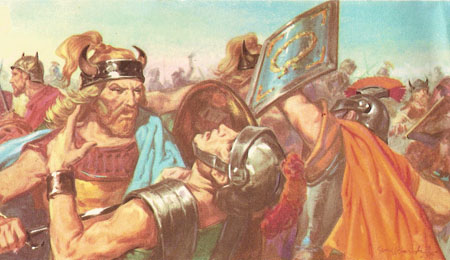Agricola, Gnaeus Julius

Figure 1. During his invasion of Scotland, Agricola gained a great victory over the Picts at a place called Mon Graupius. Today it is not certain where this is, but the Grampian Mountains have been named after it.

Figure 2. Agricola was the father-in-law of the great Roman historian Tacitus, who described his works and achievements in Britain. Here Tacitus is seen writing his Annals.
After the visits of Julius Caesar to Britain, nearly 100 years passed before the Romans returned. In the year AD 43 the emperor Claudius I ordered an invasion of Britain. No doubt he expected an easy prey; this small island would soon be conquered and made to accept Roman rule and Roman ways. In this he was optimistic; the Britons resisted fiercely and, although in a pitched battle they were no match for the disciplined and experienced Roman legions, they withdrew to the mountains of Wales and the northern parts of the country, and carried on guerilla warfare – setting ambushes and making sudden raids.
The center of resistance was the Druids who realized that Roman rule meant the end of their power. They were always stirring up the Britons and urging them to rebel. In AD 61, a terrible year in Britain's history, the Roman governor, Suetonius, decided to put an end to these trouble-makers; they were hunted down to their headquarters in Anglesey and slaughtered. But while this was going on, a rebellion under Queen Boadicea broke out in the east of Britain; London was captured and over 70,000 people were massacred. Only just in time did Suetonius gather together all the Roman troops in Britain. In the battle that followed the Romans were, as always, victorious. They did not hesitate to take a terrible revenge, and another massacre ensued.
The next 17 years were an unhappy period in British history. Always British tribes were rebelling and then being fearfully punished. It seemed that the Romans would never pacify these fierce islanders; it even looked at one moment as if the Britons might be exterminated. But then came a change. The rebellions died down and the Britons began gradually to adopt Roman customs.
This really began when Julius Agricola became governor in AD 78. At first he waged war relentlessly; Wales was finally subdued and then he turned north. So far the Romans had proceeded no further than a line stretching from Chester to Lincoln. Beyond this line many of the Britons had withdrawn and were making frequent raids on Roman settlements. Agricola saw that there would be no peace until this danger was removed. He advanced as far as the Tyne and then on into Scotland (then called Caledonia). He didn't have to worry about his lines of communication, as he was being supplied by sea. He then thought about an invasion of Ireland, but decided instead to push on further north. However, when after the battle of Mons Graupius (Figure 1) he saw the Picts setting fire to their homes and preparing to withdraw to yet another mountain stronghold, he realized that the conquest of Caledonia would have to be left to another year. He was quite convinced that the whole of Britain would have to be conquered, and he had already sent a fleet round the Orkneys (thereby proving for the first time that Britain was an island). However, soon afterward he was recalled to Rome. The emperor was jealous of him and was unwilling to add even more provinces to his enormous empire.
Julius Agricola was much more than a great general. He did far more important work in Britain than defeating the Picts. For he, more than any other Roman governor, made friends with the Britons and persuaded them to give up their savage ways and adopt the more civilized customs of Rome. He induced many of them to abandon their lairs in the forest and to live in towns; these were built in Roman fashion with temples, market squares, and colonnades. He started schools in Britain and brought over schoolmasters from abroad to teach in them. The Britons were taught better methods of agriculture, how to build Roman houses (villas), and, very important, how to build roads.
In time Britain was to become one of the most contented of the Roman provinces and was to enjoy over 300 years of peace and prosperity. It was under Agricola that this Golden Age began.
| Important dates in Romano-British history | |
|---|---|
| BC 55 | Julius Caesar's first visit to Britain |
| AD 43 | Claudius's invasion of Britain |
| 61 | Rebellion of Boadicea |
| 78–85 | Agricola governor of Britain |
| 120 | Hadrian's Wall |
| 410 | Romans leave Britain |
